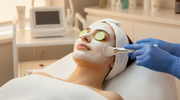Back label: Top ingredients to avoid in your makeup, according to experts

We get it – when buying makeup, the formulas' colours, textures and look and feel take centre stage. Reading the ingredient list then seems akin to decoding a synthetic cosmetic soup that seems to be more than a tad bit daunting. Yet, doing this can work wonders to improve your skin and health. Those sublime-looking products often contain dubious ingredients linked to everything from allergies to skin irritation, reproductive issues, tumours, cell mutation and endocrine disruption. So what do you need to avoid? We ask the experts to clear up any cosmetic confusion about what's lurking in your makeup.
Formaldehyde
Used to prevent bacterial infections and increase the lifespan of makeup, formaldehyde is a known carcinogen and an eye and skin irritant. Low levels of this have been linked to cancer. If you've ever had to deal with your eyes burning when opting for a salon hair straightening treatment, you can put it down to this ingredient. In cosmetics, the effect is slower and over the long term. "To conceal the presence of formaldehyde, many brands use other molecules that release formaldehyde such as Bronopol, DMDM hydantoin, Diazolidinyl urea, imidazolidinyl urea, and Quaternium-15, which are cosmetic preservatives that slowly form formaldehyde. So read the ingredient list and skip products that contain any of these," says Dr. Jushya Sarin - M.B.B.S., M.D. (Dermatology, Venereology & Leprosy), MRCP (SCE), UK.
Synthetic fragrance and colour
"One of the prime reasons a brand may choose to use a synthetic fragrance is that it lasts much longer than a natural one. Natural fragrances last up to one or two years, whereas synthetic fragrances can last up to five years. They are also harder to solubilise. Additionally, it serves to cover up the smell of other foul ingredients that may dissuade consumers from buying the products," says Dr. Kiran Sethi, MD, Integrative Skin and Wellness Physician and author of Skin Sense. Of course, it also makes for a great marketing tactic as we know the power of smell to take us down memory lane or impart that sense of luxuriousness or a feel-good factor. Add synthetic colour to the mix, and you have a recipe for skin disaster. "Products made with synthetic fragrances and colour have a low tolerance, thereby having a higher tendency to cause allergy, irritation and skin problems such as acne. They disrupt the skin's natural moisture and oil balance, clogging pores and causing inflammation. It can also cause allergic reactions and contact dermatitis in sensitive skin types. People with eczema, rosacea or hyperpigmentation should avoid them too, as they can aggravate such problems," she advises. Another point to note is that synthetic-fragranced products smell fresh for longer periods of time, so check the expiration dates of such products before using them. Sethi suggests opting for mineral-based products instead.
Parabens
This widely-used cosmetic ingredient has come under massive scrutiny in recent times. "Parabens are dangerous and can cause wreak havoc on your sex hormone, i.e., estrogen leading to decreased sperm count, and their use is also linked to breast and skin cancer," says Dr. Karishma Kagodu, Cosmetic Surgeon and Founder of Dr. Karishma's Aesthetic. "It is best to avoid these products as much as possible. Sodium Benzoate (and Benzoic Acid), potentially in combination with Potassium Sorbate, is an acceptable alternative. Or, one can opt for a safer paraben, such as ethylparaben: 0.4%, methylparaben: 0.4%, butylparaben + propylparaben: 0.19%, or total paraben concentration (i.e. a mix of them): 0.8%," she adds.
Lead
Given that lead is a naturally present mineral, it's a common ingredient in cosmetics. "The maximum lead content allowed is 10 parts per million and products are expected to stay below this limit. But several brands tend to go far above this, which is when it becomes a problem," says Dr Renita Rajan MD DNB, Chief Consultant Dermatologist and Founder of RENDER Skin and Hair. She points out that traditional eye products like kohl or kajal often contain over 70% of lead, as do the more conventional cosmetic ones. In lipsticks, too, lead is usually found because of the extraction process of certain colouring agents, primarily red. "High levels of lead, when absorbed into the body, can cause poisoning symptoms that begin with seemingly innocuous effects like fatigue and irritability. Lead is not an irritant or an allergen, so you don't see acute skin reactions due to its content. It is mostly the systemic toxicity that is a concern," cautions Rajan. She advises looking for lipsticks that use organic colourants and staying away from traditional eye cosmetics for pregnant and nursing mums.
Silicones
From smoothening to imparting a silky texture and adding lustre, silicones' many benefits make them one of the most widely-used cosmetic ingredients. They make your foundations, creams, primers, and lipsticks go on easily and leave your skin looking soft and velvety. "Silicones are difficult to remove and accumulate on your skin over time. Their occlusive properties act as a barrier for acne-prone skin and trap oil, dirt, and dead skin cells inside the pores, worsening acne. It also interferes with the cell renewal process stopping skin regeneration," finds Dr. Niketa Sonavane, Celebrity Dermatologist and founder of Ambrosia Aesthetics. She advises avoiding makeup that has ingredients that end in "-cone/methicone" or "siloxane". "At least opt for silicone-free foundations and primers that hydrate and nourish your skin if you cannot give up silicone in all products. Water-based foundations might wear off faster but are better for your skin. But, if you must use silicone-based products, double-cleanse while removing your makeup to keep your complexion problem free," she says.
Phthalates
This ingredient helps to improve the texture of creams and lotions, prevents oil-based foundations from staining and enhances colour and fragrance. "It can cause endocrine disruption, which can lead to reproductive issues, damages the kidneys and liver, and has been linked to cancer and to an increased risk of asthma, allergies, and other chronic health conditions," says Dr. Charu Sharma, Head of Dermatology at Cureskin. Certain groups may be at a greater risk than others. "Individuals with acne may be more sensitive to their negative effects, as these chemicals may exacerbate existing skin conditions or cause breakouts. Also, pregnant women and children are at a higher risk of exposure due to their heightened vulnerability. It's safer to opt for organic makeup products that are made with plant-based ingredients and do not contain harmful additives," she recommends.
Read full article on :https://www.vogue.in/beauty/content/back-label-avoid-these-6-ingredients-in-your-makeup-according-to-experts


